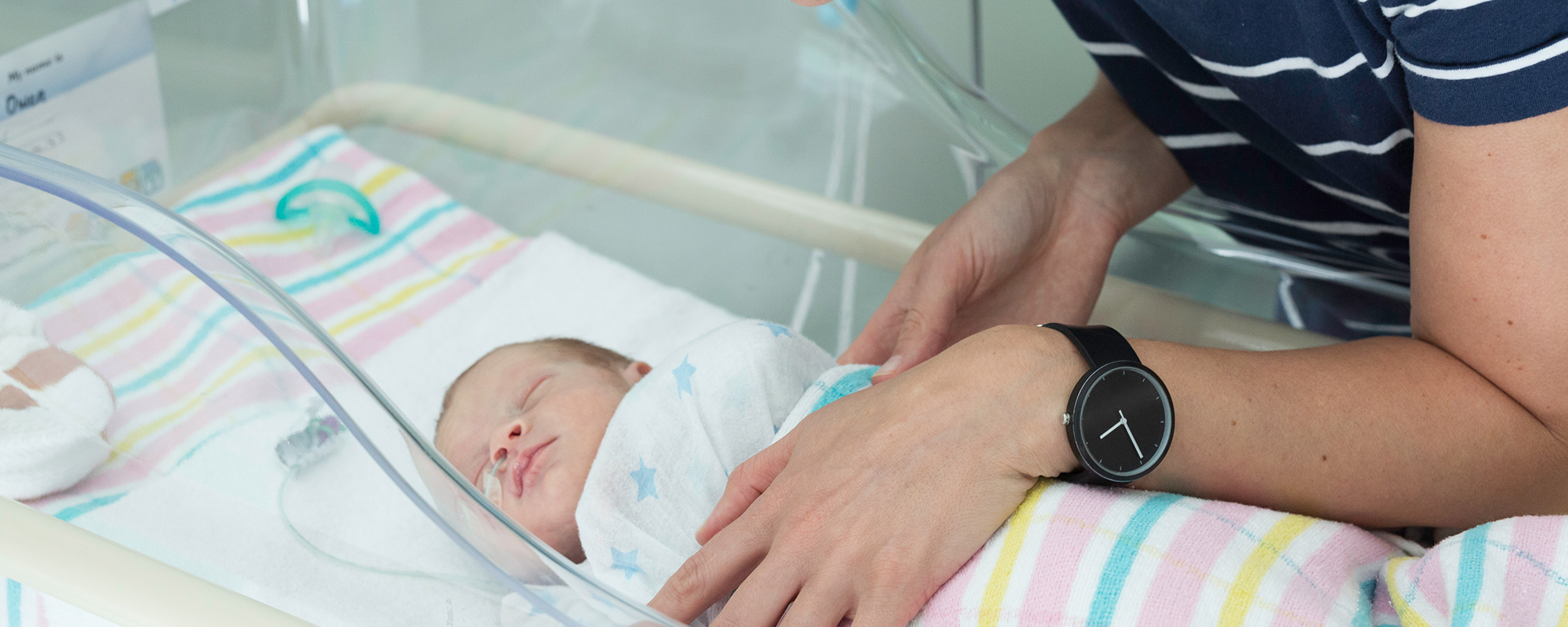
Special Care Nursery
The Special Care Nursery (SCN) is a 12-bed, Level 4, High Dependency Unit that provides specialised care and observation for babies born from 32 weeks onwards. The Unit is staffed with highly-trained Neonatal Nurses and Midwives, a team of Paediatricians rostered on daily, and on-call doctors 24-hours a day.
The SCN uses an evidence-based model of newborn intensive care that protects babies' neurodevelopment while they are in hospital. We know that premature or ill babies are likely to recuperate faster, and have better outcomes, when we enhance the strengths in their care environment. A baby's parents and family are at the forefront of this care.
- Anytime of day or night - We want you to spend as much time as possible with your baby. It is so important that they are aware of your presence - can hear your voice and feel your touch. We aim to provide family-centred care and encourage you to participate as much as possible in the care and management of your baby. SCN staff are here to guide you.
- NICVIEW cameras - Each bed has newborn video streaming equipment for parents to access when they cannot be at their baby's bedside. These cameras can help families feel more involved in the care of their baby, develop trust in the medical team, and can even stimulate mum's milk supply when expressing from afar.
Skin-to-skin care is when your baby is placed directly on to your (or your partner's) bare chest. The benefits of skin-to-skin contact are significant, particularly for babies in the SCN. All our babies can take part if their condition is stable.
Skin-to-skin care can:
- enhance bonding
- help baby to conserve energy
- stabilise baby's heart rate and breathing
- stabilise baby's temperature
- increase baby's tolerance to noise and stress
- increase your milk supply
- enable earlier and more successful breastfeeding
- help with baby's brain development
- lead to earlier discharge from hospital.
- IV feeding - Your baby's condition will determine how and when feeding will start. If they are not ready for milk feeds, an IV line (drip)will be inserted to supply the fluids necessary to meet their needs.
- Breastfeeding - If your baby is unable to suck, but you intend to breastfeed, it is important for you to stimulate your breasts regularly. If possible, start expressing as soon as you can after delivery. The nursing staff can help you with breastfeeding and expressing milk. No matter the volume, we will give all expressed breast milk to your baby.
- Formula-feeding - If you choose to formula-feed your baby, nursing staff will assist you and provide information on formula preparation and sterilising equipment.
To help babies better cope with their surroundings, the SCN tries to keep environmental stimulation to a minimum.
We do so by:
- dimming the lights
- minimising ambient noise - we use wall-mounted SoundEar devices to manage volume
- clustering care - grouping basic care activities to allow baby to have uninterrupted rest
- nesting - positioning babies with rolls and bedding
- having quiet time between 1:30 and 3:30pm - we don't allow visitors during this period, and it is often used for skin-to-skin contact.
Family-centred care involves providing care for parents as well as babies. We look at everyone in the family to ensure the baby's journey is a success.
Professional support available to you and your family:
During your baby's stay, you have access to our Allied Health team, as well as a range of community referrals that can be arranged on your behalf. These include:
- Lactation consultants
- Physiotherapists
- Social workers
- Mental health professionals
- Parenting support workers
- Drug and alcohol support workers
Survival tips for you:
It's easy to feel overwhelmed and anxious while your baby is in the SCN.
- Time for yourself - It's important for your well being that you make time to eat, sleep, talk to your partner/family/friends and spend some time outside of the SCN.
- Calls and messages - If you are being bombarded, you can record a message update each day and send all calls to message bank. Or ask a friend/relative to pass on information to others for you.
- Visitors - Feel free to limit your visitors to only those you wish to see.
- Journaling - Many parents find that keeping a journal helps capture medical information and the progress of their baby.
- Accept all offers of help - For example, cooked meals, childcare, lifts to and from the hospital if you are discharged before your baby.
- Zen Room - There is a room in the SCN in which parents can rest and enjoy some quiet time.
If your baby becomes very ill, we will stabilise and efficiently transfer him/her from the SCN to the Neonatal Intensive Care. Babies are transferred by the specialist Newborn and Paediatric Emergency Transfer Service (NETS).
Our Hospital was purpose-built to provide seamless access for the NETS team, and our retrieval room is outfitted with equipment and technologies that generate on-the-spot data about your baby's condition. With critical information at our fingertips, we are able to escalate the level of care as needed and reduce stabilisation time.
When your baby no longer requires a higher level of care, they may be transferred back to the SCN at Northern Beaches Hospital.

